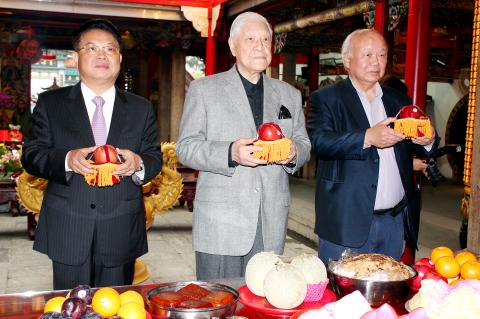Control Yuan President Wang Chien-shien yesterday made a caustic retort to former president Lee Teng-hui’s (李登輝) response over a recent spat stemming from a Control Yuan report regarding Lee’s parentage, saying: “We are all sinners,” including Lee.
On Wednesday, when asked about his reaction to a Control Yuan report that quoted an academic as saying that Lee could be the illegitimate child of a Japanese man, Lee said there was no point in getting himself worked up because “Taiwan’s future is more important to me than things like this.”
Lee said he would instead “pray to God to forgive their sins and stupidity.”

Photo: Huang Mei-chu, Taipei Times
Wang said on Tuesday that the Control Yuan report “was like firing a cannon at a bird,” and that “a bad bird deserved it.”
In response to media queries about Lee’s comments on Wednesday, Wang said he found what Lee said about the matter “very useful.”
“Pray for God’s forgiveness for all sinners. All people, including Lee Teng-hui, should think about whether they need to ask for forgiveness. Everyone has sinned, no matter how big or small they are. People who repent of their sins please God,” Wang said.
The report was completed by Control Yuan members Chou Yang-shan (周陽山) and Lee Ping-nan (李炳南) after they conducted an investigation into the preservation of documents related to the 228 Incident in 1947. The incident was an uprising against the then-Chinese Nationalist Party (KMT) regime.
Critics of the report accused the Control Yuan of focusing on issues that are not related to its functions, instead of acting as a government watchdog.

INVESTIGATION: The case is the latest instance of a DPP figure being implicated in an espionage network accused of allegedly leaking information to Chinese intelligence Democratic Progressive Party (DPP) member Ho Jen-chieh (何仁傑) was detained and held incommunicado yesterday on suspicion of spying for China during his tenure as assistant to then-minister of foreign affairs Joseph Wu (吳釗燮). The Taipei District Prosecutors’ Office said Ho was implicated during its investigation into alleged spying activities by former Presidential Office consultant Wu Shang-yu (吳尚雨). Prosecutors said there is reason to believe Ho breached the National Security Act (國家安全法) by leaking classified Ministry of Foreign Affairs information to Chinese intelligence. Following interrogation, prosecutors petitioned the Taipei District Court to detain Ho, citing concerns over potential collusion or tampering of evidence. The

TRADE: The premier pledged safeguards on ‘Made in Taiwan’ labeling, anti-dumping measures and stricter export controls to strengthen its position in trade talks Products labeled “made in Taiwan” must be genuinely made in Taiwan, Premier Cho Jung-tai (卓榮泰) said yesterday, vowing to enforce strict safeguards against “origin laundering” and initiate anti-dumping investigations to prevent China dumping its products in Taiwan. Cho made the remarks in a discussion session with representatives from industries in Kaohsiung. In response to the US government’s recent announcement of “reciprocal” tariffs on its trading partners, President William Lai (賴清德) and Cho last week began a series of consultations with industry leaders nationwide to gather feedback and address concerns. Taiwanese and US officials held a videoconference on Friday evening to discuss the

NEGOTIATIONS: The US response to the countermeasures and plans Taiwan presented has been positive, including boosting procurement and investment, the president said Taiwan is included in the first group for trade negotiations with the US, President William Lai (賴清德) said yesterday, as he seeks to shield Taiwanese exporters from a 32 percent tariff. In Washington, US Trade Representative Jamieson Greer said in an interview on Fox News on Thursday that he would speak to his Taiwanese and Israeli counterparts yesterday about tariffs after holding a long discussion with the Vietnamese earlier. US President Donald Trump on Wednesday postponed punishing levies on multiple trade partners, including Taiwan, for three months after trillions of US dollars were wiped off global markets. He has maintained a 10 percent

PERSONAL DATA: The implicated KMT members allegedly compiled their petitions by copying names from party lists without the consent of the people concerned Judicial authorities searched six locations yesterday and questioned six people, including one elderly Chinese Nationalist Party (KMT) member and five KMT Youth League associates, about alleged signature forgery and fraud relating to their recall efforts against two Democratic Progressive Party (DPP) legislators. After launching a probe into alleged signature forgery and related fraud in the KMT’s recall effort, prosecutors received a number of complaints, including about one petition that had 1,748 signatures of voters whose family members said they had already passed away, and also voters who said they did not approve the use of their name, Taipei Deputy Chief Prosecutor